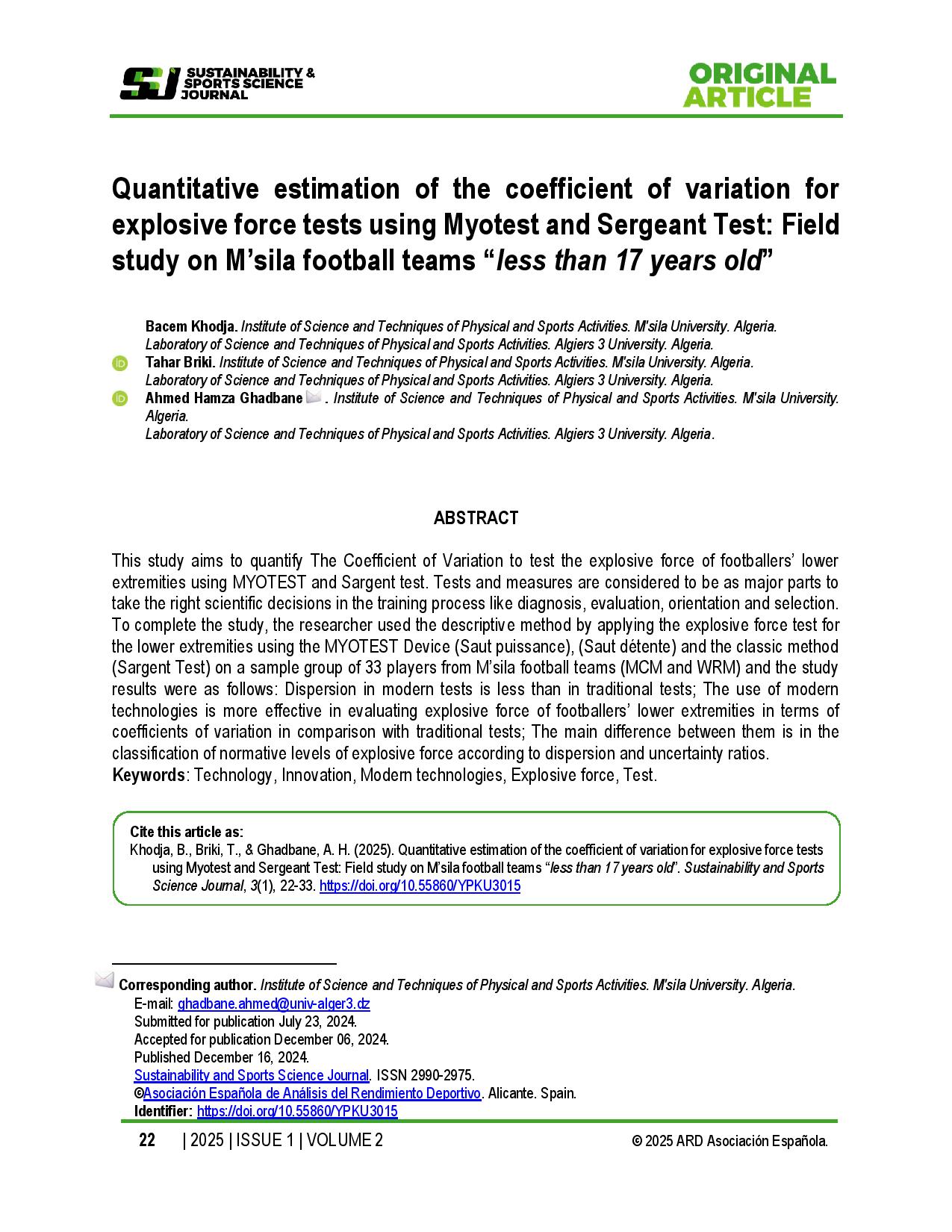Quantitative estimation of the coefficient of variation for explosive force tests using Myotest and Sergeant Test Field study on M’sila football teams “less than 17 years old”
Main Article Content
Abstract
This study aims to quantify The Coefficient of Variation to test the explosive force of footballers’ lower extremities using MYOTEST and Sargent test. Tests and measures are considered to be as major parts to take the right scientific decisions in the training process like diagnosis, evaluation, orientation and selection. To complete the study, the researcher used the descriptive method by applying the explosive force test for the lower extremities using the MYOTEST Device (Saut puissance), (Saut détente) and the classic method (Sargent Test) on a sample group of 33 players from M’sila football teams (MCM and WRM) and the study results were as follows: Dispersion in modern tests is less than in traditional tests; The use of modern technologies is more effective in evaluating explosive force of footballers’ lower extremities in terms of coefficients of variation in comparison with traditional tests; The main difference between them is in the classification of normative levels of explosive force according to dispersion and uncertainty ratios.
Article Details

This work is licensed under a Creative Commons Attribution-NonCommercial-ShareAlike 4.0 International License.
References
Bampouras, T. M., Relph, N. S., Orme, D., & Esformes, J. I. (2013). Validity and reliability of the Myotest Pro wireless accelerometer in squat jumps. Isokinetics and Exercise Science, 21(2), 101–105. https://doi.org/10.3233/IES-130484
Comstock, B. A., Solomon-Hill, G., Flanagan, S. D., Earp, J. E., Luk, H.-Y., Dobbins, K. A., Dunn-Lewis, C., Fragala, M. S., Ho, J.-Y., Hatfield, D. L., Vingren, J. L., Denegar, C. R., Volek, J. S., Kupchak, B. R., Maresh, C. M., & Kraemer, W. J. (2011). Validity of the Myotest® in Measuring Force and Power Production in the Squat and Bench Press. The Journal of Strength & Conditioning Research, 25(8). https://doi.org/10.1519/JSC.0b013e318200b78c
Cortsen, K., & Rascher, D. A. (2018). The Application of Sports Technology and Sports Data for Commercial Purposes. InTech. https://doi.org/10.5772/intechopen.80742
Houel, N., Dinu, D., Faury, A., & Seyfried, D. (2011). Accuracy and reliability of the Myotest Pro system to evaluate a squat jump. Procedia Engineering, 13, 434–438. https://doi.org/https://doi.org/10.1016/j.proeng.2011.05.110
Mackenzie, B. (2005). 101 Performance Evaluation Tests, Electric Word plc, London.
Sanjib Kumar Dey. (2020), " Modern technology and sports performance: An overview", International Journal of Physiology, Nutrition and Physical Education, Volume 5, Number 1, p 212-216.
Schmidt, S. C. E., Gnam, J.-P., Kopf, M., Rathgeber, T., & Woll, A. (2020). The Influence of Cortisol, Flow, and Anxiety on Performance in E-Sports: A Field Study. BioMed Research International, 2020(1), 9651245. https://doi.org/https://doi.org/10.1155/2020/9651245
Subic, A. et al. (2011). The Impact of Technology on Sport IV. 5th Asia-Pacific Congress on Sports Technology, p2.
Swinnen, B. (2016). Strength Training for Soccer (1st ed.). Routledge. https://doi.org/10.4324/9781315665276
Viduka, D., Ilić, L., Dimitrijević, V. (2021). Modern Technologies in Sport, with Reference to Video Technologies. Paper presented at Sinteza 2021 - International Scientific Conference on Information Technology and Data Related Research. https://doi.org/10.15308/Sinteza-2021-277-281




